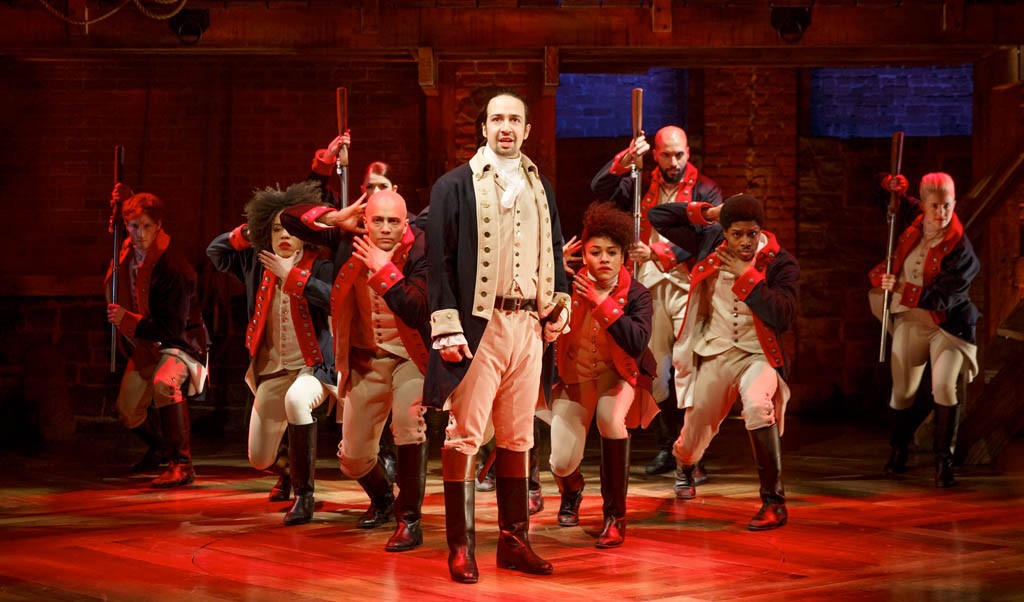#Hamiltunes

Hamilton doesn’t need an introduction. But, in case you’ve been living under a rock for the last year, here’s a quick primer: the show is a hip-hop musical about the life of Alexander Hamilton. Yes, that Alexander Hamilton—the one whose gentlemanly portrait is printed on every $10 bill; the one who engineered America’s financial system; the one whose death in a duel launched one of the most memorable commercials of all time. Yes, I said “hip-hop musical” about this guy. And, you know what? It’s genius. The musical is as scrappy, unlikely, bold, and astonishingly original as the Founding Father whose story it tells. Even more interesting: Hamilton smashes our expectations by employing a multi-racial cast to tell the ultimate Dead White Guy story, thus reclaiming history for all Americans, and reminding us of the importance of “who tells your story.”
Yet, despite these welcome, exciting components, at the end of the day Hamilton (written by the great Lin-Manuel Miranda) is surprisingly an earnest, sincere, and old-fashioned Broadway musical—and that is another reason why it is a breath of fresh air in a theater world dominated by the biting irony and over-the-top eccentricity of shows like Book of Mormon or Avenue Q. Hamilton neither mocks nor breaks from musical theater as we know it; rather, it emerges from a rich tradition of musical theater, both past and present, and lovingly pays homage to the form, even as it takes that form in new directions. It’s high-minded without being out-of-touch, shamelessly romantic without being corny, and clever without being cynical. Hamilton is the anti-Book of Mormon: it is a musical that devoutly celebrates its form.
Though its sound may be hip-hop, Hamilton’s heart beats to Broadway. It taps its hat to musicals that have come before it. Don’t believe me? Here are 5 Broadway references you may have missed:
- “Aaron Burr, Sir”: Lerner and Loewe’s “C’est Moi” from Camelot
“Oui, oui, mon ami, je m’appelle Lafayette,
The Lancelot of the Revolutionary Set!
I came from afar just to say, “Bonsoir!”
Tell the king, “Casse-toi!” Who’s the best?
C’est moi!”
If you don’t know Camelot, the ghost of JFK is weeping somewhere. But seriously, it’s probably one of the most popular shows of the 20th century (and badly in need of a revival—hint, hint, producers!). The show is loosely based on T.H. White’s The Once and Future King and its take on the Arthurian legend. This is one of Miranda’s favorite shows, and so it’s unsurprising that he lyrically positioned the aristocratic and supremely confident Lafayette as the “Lancelot of the Revolutionary set” who has come from France to offer his military services.
- “Say No to This”: Jason Robert Brown’s “Nobody Needs to Know” from The Last Five Years
Everybody needs to know you’re a feral tomcat, Alex. The song about Hamilton’s affair with Maria Reynolds ends with the line, “Nobody needs to know,” which directly references Jamie’s song of adultery.
- “Right Hand Man”: Gilbert and Sullivan’s “Major General’s Song” from The Pirates of Penzance
Washington is “the very model of the modern major General,” a line lifted from one of the most popular patter songs of all time.
- “The Adams Administration” : Sherman Edwards’ “Sit Down, John” from 1776
“Sit Down, John” is the opening number in 1776, and demonstrates how John Adams is a contrary and overbearing politician whom no one likes… and that sentiment is echoed by A.Ham’s frustration with Adams in the line: “Sit down, John, you fat Motherf***er.”
- “My Shot” : Rodgers and Hammerstein’s “You’ve Got to Be Carefully Taught” from South Pacific
Anyone who dismisses Rodgers and Hammerstein musicals as simple and quaint need to take a second look at the song “You’ve Got to Be Carefully Taught,” which expresses outrage at how racism is taught to younger generations—Lt. Cable sings this song out of frustration that he cannot publicly love Liat, a young Tonkinese woman. Burr’s use of this line in Hamilton underscores his own inability to publicly state his beliefs in a society where proclamations of revolution are treasonous.
To some extent, Hamilton isn’t unique in its use of contemporary sounds in musical theater. It has also benefited from the increasing presence off-Broadway of experimental historical pop-musicals in recent years: Bloody Bloody Andrew Jackson, Here Lies Love (move over, Evita!), and Natasha, Pierre, and the Great Comet of 1812 (which starred Eliza Schuyler herself, Phillipa Soo!), shows that played with the musical theater form. But Hamilton is distinct from these shows in its scope: it is not a boutique theatrical experience/experiment, rather a self-proclaimed “American musical” that is traditional in its structure and narrative. Indeed, it tells a rags-to-riches story that, in many ways, is a classical tragedy: that which makes Hamilton great is also what ultimately leads to his death. You can’t get more traditional than that.
I love this show for so many reasons. But I especially love it for what it’s done for Broadway and the enthusiasm and excitement it has incited. Hamilton reminds the general public that musicals aren’t quaint little shows from the American past, but musically complex, important, and noteworthy pieces of culture that can still excite, provoke, and inspire us.
Photo Credit: Joan Marcus / Hamilton


Discussion about this post